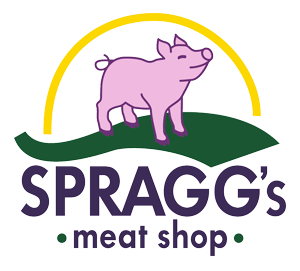As a small-scale family farm right here in Alberta, we have built Spragg's Meat Shop to be a sustainable and fully local food production chain. Farming has historically been a way of life in rural areas, and we believe that continuing to honour the tradition of the family farm benefits communities, consumers, and society.
At Spragg's Meat Shop, we are the farmer, the butcher and the meat shop - meaning our focus is on producing high-quality products in our community, for our community. We readily acknowledge that large-scale farming operations have their valuable place in our community to feed our country, and we believe that by staying small for our farm and selling to a local consumer base, we can provide a balance for the ecosystem. As a small-scale and sustainable farm, we are able to give the animals space and freedom to graze, forage and express their natural behaviours and instincts. It helps protect animals, the environment and our natural resources.
With that in mind, we wanted to tackle some common misunderstandings about small-scale sustainable pork farming;
Sustainability is just about the environment
Typically, when people think of sustainability, they tend to focus on environmental issues alone, but sustainable agriculture is about more than that. Sustainability ensures that the holistic economic, social and environmental needs of present and future generations can be met. Small farms are the cornerstone of healthy rural communities and local economies, contributing positive ecological, social and economic dimensions. That’s why we are focused on staying 100% local in everything we do.
Pork farming has a large carbon footprint
According to the Canadian Pork Council, there are more than 7,000 pig farms across Canada producing more than 25.5 million animals a year. The industry supports 31,000 farm jobs which, in turn, contribute to 103,000 direct and indirect jobs across the country. Despite that significant economic activity, a report from 2018 showed that the Canadian pork carbon footprint is among the lowest in the world, accounting for 1.6% of total Canadian carbon emissions in 2017. For small-scale farms focused on local production, that impact is even lower.
While there are still many steps the industry can take to continue to reduce environmental impact, we believe this demonstrates how pork farming, both large and small-scale, can be a sustainable and viable contributor to the Canadian economy.
Pigs can't tell you when they're stressed
While we haven't determined how to translate their oinks into English (not yet anyway!), pigs let you know when they are stressed or unhappy. Pigs that are not able to develop natural behaviors can become bored and develop abnormal or destructive tendencies. This stress weakens the pig's system, leaving them more susceptible to illness. That is why we are so focused on providing our pigs with the best possible living conditions during their time on the farm, allowing them to graze and forage in a low-stress environment.
If you’re passionate about supporting small-scale family-farms, we invite you to join the Spragg’s family journey! Visit us at one of our two Calgary locations, including The Calgary Farmer’s Market or our Rosemary meat shop to buy local, eat local and support sustainable farming!
SPRAGG’S MEAT SHOP CALGARY
9675 Macleod Trail SE
Calgary, AB, T2J 0P6
P: 403.255.1232
E: calgarystore@spraggsmeatshop.com
SPRAGG’S MEAT SHOP ROSEMARY
438 Centre St
Rosemary, AB, T0J 2W0
P: 403.378.3800
E: meatshop@spraggsmeatshop.com

